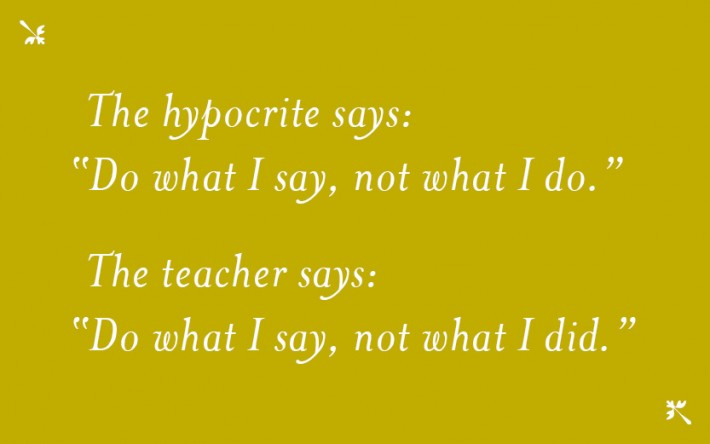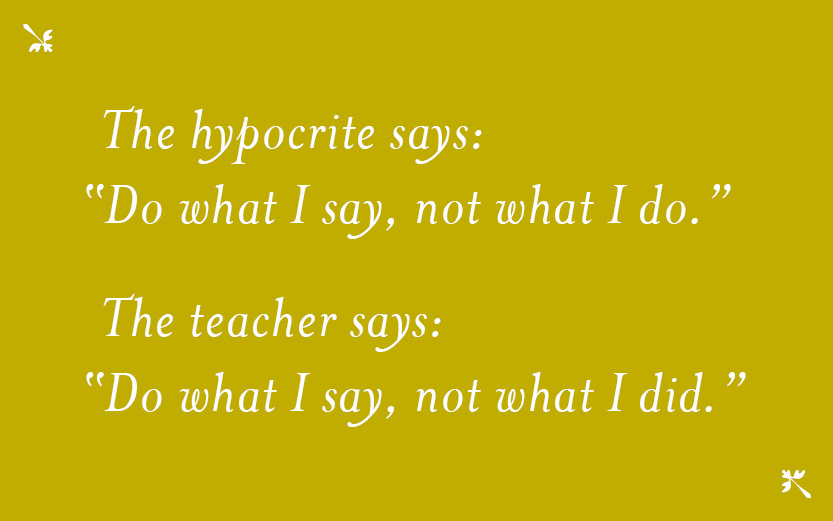On heeding New Year’s resolution advice: The difference between hypocrites and teachers
New Year’s resolutions can often be based on advice from others. To what extent do we trust advice based on where another has been versus where they are now? And what does this mean for advice we give to others?

On heeding advice
The New Year can hold near-spiritual connotations for resolutions. Our propensity for making broad declarations can be attributed to the start of something new combined with holiday time off for reflection. So long as we do not fill it with other noise, the commercial machine offers a gap between Christmas and New Years to consider what we want more of and less of in our lives.
“Problems cannot be solved by the level of awareness that created them.”, or so goes the quote dubiously attributed to Einstein. Our awareness changes through our experience as well as through input from books, films, and advice. As I plan my own version of 2012, I also consider the collective input I have amassed over the past 12 months.
I acknowledge I work a bit too hard. My pace often prompts advice from older executives who have followed my path themselves but now “see the light”. I will admit to some frustration at what I have considered a hypocritical position.
Et tu, Bill Gates?
I know what it takes to build and grow. Metaphoric examples such as “breaking orbit” or “giving birth” involve extreme amounts of energy and frequently pain. I know what well-meaning leaders have sacrificed in the form of families, character, and health to build their empire. Who do they think they are to turn around and tell me there is a better way or that it is not my place to follow in their steps?
And yet their recommendations ring true, even as I find myself wanting to offer the same advice to others. I also find, however, that I cannot always look others in the eye as I attempt to promote a better way. There is a principle in coaching that you can only give what you have, and I have yet to master many of the principles purported by management gurus.
These thoughts were top of mind as I researched my previous blog post on Firms of Endearment. In a 2008 blog post, co-author David Wolfe plays out a situation similar to the one described above involving Microsoft’s Bill Gates:
On Thursday, the richest man in the world made an impassioned plea at the annual World Economic Forum in Davos, Switzerland. He urges businesses the world over to adopt what he called creative capitalism as a way to sharply curtail abject poverty on a worldwide basis.
Gates was savaged on CNBC’s Kudlow & Company by an assortment of Wall Street cognoscenti. They accused Gates of forgetting his roots as one of the most accomplished capitalists in history and selling out to do-goodism.
A friend who saw Larry Kudlow and his incensed companions damn Gates emailed me, “In essence, they ridiculed tough CEOS who played “hardball” in building their companies and their assets, only to become evangelists for the importance of “doing good works” as part of the business platform, AFTER they’ve attained their market objectives. They see these CEOs as dangerous to the capitalistic values that made their companies great.”
The evolution of a resolution
I wonder if Gates is challenged with how to offer advice that is perceived as contrary to the worldview that contributed to his success. At what point did he shift into a different way of thinking, or was he always trying to push an agenda that was frustrated by the commercial machine? If we were to track his resolutions year on year, would we see a growing emphasis on making a difference rather than making software?
Goals are important, but there is a risk in our resolutions of adding yet another to-do list to the pile. I am following a path of being realistic about change and defining meaning in the changes we make. This is based on a belief that to do different, we must be different. Transformation of our organisations can only come from transformation of those with influence within the organisation.
We can still learn from the pain we see in others. How much more effective is that learning when it comes with the inspiration of someone who has figured it out?
With this in mind, I look to 2012 thinking of advice I want to give to others in the near future and a resolution to become more a teacher and less a hypocrite.

